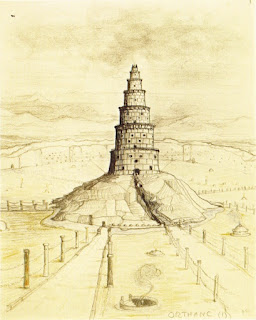The Two Towers: Tolkien, Duality, and the tendency toward deception
In this episode we discuss Tolkien's knowledge of Sacred Geometry, the crisis posed by Scholasticism, the treachery of images (with a nod to Magritte), and how our tendency to think in duality has the propensity to lead us into deception - even deceiving ourselves.
There exists (even in Tolkien's mind) a bit of confusion about which towers the title of the work is referencing.
In a letter to Rayner Unwin (the publisher) from Aug 17, 1953 (Letters #140), Tolkien wrote:
"The Two Towers" gets as near as possible to finding a title to cover the widely divergent Books 3 and 4; and can be left ambiguous - it might refer to Isengard and Barad-dûr, or to Minas Tirith and Barad-dur; or Isengard and Cirith Ungol."
I opt for the relationship between Minas Tirith and Minas Morgul (Barad-dur).
Nota Bene: The poet and aesthetic philosopher Samuel Taylor Coleridge introduced the term "suspension of disbelief" in 1817 and suggested that if a writer could infuse a "human interest and a semblance of truth" into a fantastic tale, the reader would suspend judgement concerning the implausibility of the narrative.
Also, Plato uses the term "Thaumatapoioi" (wondrous creations, "shadow puppets") in his great dialogue, "The Republic". Tolkien's image of the Ring has much in common with Plato's Thaumatapoioi and with the Ring of Gyges which makes one invisible. For Plato, as for Tolkien, the images must lead us to see the really real, the Good, Illuvatar - but taken in themselves they are like Lothlorien in their beauty but must be allowed to fade away.
Lastly, wrt names in the novel - this from Behind the Name:
Frodo: Derived from Old English froda meaning "wise".
Samwise Gamgee: Means "simple, half wise" from Old English sam "half" and wis "wise".
Meriadoc (Merry): From an old Breton name composed of the elements mer "sea" and iatoc "forehead". Conan Meriadeg was the legendary founder of Brittany.
Peregrine (Pippin): From the Late Latin name Peregrinus, which meant "traveller". (Frankish name of unknown meaning. It possibly means "awe-inspiring" from Frankish bib- "to tremble". This was the name of three majordomos of Austrasia including Pépin III the Short, who became the first Carolingian king of the Franks. He was the father of Charlemagne.)



Comments
Post a Comment